Sea Grant International: Extending the Model of Applied Research, Outreach, and Education to Other Countries
NOAA Sea Grant is working to foster sustainable resource use and social development in marine and coastal environments by supporting three international efforts to adapt the Sea Grant model of applied research, extension, and education to international contexts. The goal of these international efforts is to improve coastal and marine resource management both for the United States and international partners through a global network of institutions that are dedicated to outreach, applied research, and education.
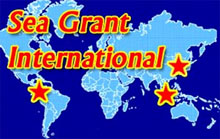
Map showing the location of Sea Grant International Programs.
NOAA Research's Office of International Activities (NOAA Research IA) and the National Sea Grant Office (NSGO) are helping a handful of other countries to adopt the Sea Grant model. The National Sea Grant College Program is a proven, effective model to engage universities and government agencies acting in partnership to promote research, education, and outreach/extension related to marine issues. Through network contacts at over 300 universities and research institutes and the NOAA National Sea Grant Office, individual Sea Grant programs stay connected to issues at a national level while being responsive to local-level needs. Because the Sea Grant model is inherently flexible — both culturally and administratively — there is substantial potential for other countries to adapt the model to their needs while developing cooperative programs with international partners.
"The vision of Sea Grant International is to establish a global network of committed nations which apply the Sea Grant model to build and sustain global coastal and marine resources," said Ron Baird, former director, National Sea Grant College Program. "A connected global network whereby information and technical knowledge flow freely among national programs could contribute enormously to our capacity to address management issues at global and regional scales."
This vision involves working at three different levels: 1) developing national institutions; 2) building applied research, extension, and education capacity; and 3) local-level learning through peer exchanges.
Since Sea Grant was founded in 1966, there have been — and continue to be — many international activities involving collaboration on scientific research and cooperative agreements between individual Sea Grant colleges and foreign institutions. This article highlights the efforts of NOAA Research IA and NSGO in supporting the development of three Sea Grant programs, focused on institutional development activities at the national level.International Sea Grant Network Benefits
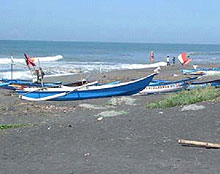
Boats on a beach in Indonesia. Photo courtesy of Indonesia's Sea Partnership Program.
Supporting other countries as they adopt the Sea Grant model helps NOAA with global marine research and coastal management through increased partners and access to information. However, more importantly, this support benefits the country or region implementing the Sea Grant model. An international Sea Grant network provides a platform that promotes international research, educational activities, and technology transfer related to coastal issues; encourages information exchange; and fosters international collaboration in activities that improve understanding of the marine and coastal environment. There are also long-term benefits to better management, including improving food security and economic growth.
Sea Grant Programs in Other Countries
Programs based on the Sea Grant concept are in various stages of development in Latin America (Ecuador, Honduras, Nicaragua, El Salvador, and Ecuador) and Asia (South Korea and Indonesia). NOAA Research IA and the NSGO work with national governments, universities, and private partners to provide technical expertise, coordinating capacity and program development functions. All of the countries adopting Sea Grant models are highly dependent upon coastal and marine resources.
Latin America and the Caribbean Regional Effort
NOAA Research IA and the NSGO, in partnership with the University of Rhode Island Coastal Resources Center (CRC) and various partners throughout Latin America and the Caribbean, are adopting the U.S. Sea Grant model in Latin America and the Caribbean. Sea Grant International efforts in this region first emerged out of the devastation left by Hurricane Mitch in 1998, especially major destruction of the shrimp aquaculture industry following the hurricane.
Local governments and university officials in Honduras, Nicaragua, El Salvador, and Ecuador expressed interest in establishing a program similar to Sea Grant. NOAA Research IA and CRC conducted a study to determine the adaptability of a regional Sea Grant in Latin America and the Caribbean. The study showed that Sea Grant would indeed be an appropriate model for coastal management in this region, especially with regard to needs for increased extension, outreach, and communication capacities. Latin American and Caribbean universities already had strong research programs, but the knowledge gained from that research was not being applied.
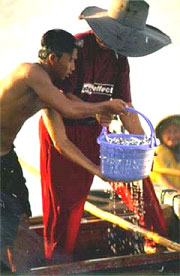
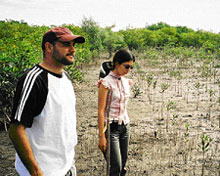
Sea Grant staff visiting a site with re-planted mangroves in Honduras.
To test the application of the Sea Grant model, two pilot studies were established — one on mainland Ecuador and the other in the Gulf of Fonseca region of Honduras, El Salvador, and Nicaragua (focusing on shrimp farming). Latin American and Caribbean partners involved include the University of Central American in Nicaragua, the University of Zamorano in Honduras, the University of El Salvador, and the Coastal Polytechnic University (Escuela Superior Politécnica del Litoral, ESPOL) in Ecuador.
Efforts are focused on implementing Sea Grant-like activities (such as assisting small-scale shrimp aquaculture farmers in areas of aquaculture technology, development, and extension) and identifying sources of future funding. NOAA Research IA, NSGO, and their partners are working to support the initial member institutions of the Latin American and Caribbean network in defining their structure, leveraging resources and operating procedures, and securing short-term bridge funding that promotes collaboration among the members of the Latin American and Caribbean network and collaborating Sea Grant institutions in the United States.
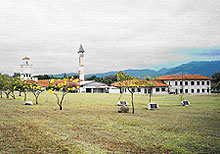
The University of Zamorano in Honduras.
As the Sea Grant model for Latin America and the Caribbean becomes better defined, it will spread throughout the region by way of peer exchanges and papers jointly supported by the Fulbright Senior Specialist Program. Sea Grant International efforts in Latin America and the Caribbean have included supporting the White Water to Blue Water campaign and collaborating with the Rhode Island Sea Grant Program, Coastal Resources Center, Fulbright Senior Specialist Program Partnership, Swiss AVINA Foundation, and SUCCESS. Specific NOAA activities have included in-country consultations, national workshops, background papers, expert meetings, and development of a strategy for a regional Latin America/Caribbean Sea Grant program.
South Korea
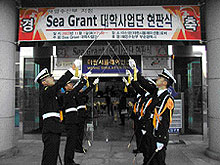
Ceremony celebrating the opening of Busan Sea Grant Consortium in South Korea. Photo courtesy of the Korean Sea Grant Program.
The Korea Sea Grant Program (KSGP) was established in 2000 by the Ministry of Maritime Affairs and Fisheries (MOMAF) as a part of "Ocean Korea 21," Korea's comprehensive plan to improve management of coastal resources. Like the U.S. Sea Grant Program, the KSGP promotes the involvement of universities in marine research through granting programs, outreach, and education.
MOMAF has been implementing the KSGP in stages. The initial phase began in 2000 and focused on the institutional organization of KSGP, as well as testing research and development granting programs. Granting programs have two tracks: government-defined themes, which address national research and development concerns and independently-defined themes, which may address more locally driven interests. The second phase, 2004-2005, established a Sea Grant consortium—Yeongnam Sea Grant—based at the Korea Maritime University in Busan. The final phase will continue until 2010 and includes plans to expand the Sea Grant program to additional schools in other regions of Korea. As part of the third phase, in January 2006, KSGP designated a second college consortium, Honam Sea Grant, in Mokpo, Korea, and in 2007, KSGP designated the third college consortium in Incheon.
NOAA Research IA and NSGO have assisted the KSGP with program development, provided on-the-ground training for newly hired Korean Sea Grant extension agents, and invited KSGP managers and extension specialists to National Sea Grant Week in the United States. There have been several exchanges between the two countries, and there is a representative from Korea's MOMAF at NOAA looking at the U.S. Sea Grant Program to better identify and address KSGP's needs.
Recent activities with KSGP have included a documentary film crew and Korea Sea Grant staff visiting four U.S. State Sea Grant Programs in January 2006 to film a documentary on the positive impacts of the U.S. Sea Grant System. In April 2006, California Sea Grant visited Busan to lead a strategic planning workshop and in July 2006, there was a follow-up meeting during which a memorandum of understanding was signed to establish sister-programs between California Sea Grant and the Honam and Yeongnam Sea Grant programs. In 2007, 13 Koreans will participate in the biannual Sea Grant meeting in San Diego, California.Indonesia
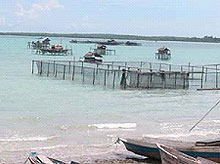
Fish nets in Indonesia. Photo courtesy of Indonesia's Sea Partnership Program..
The Indonesian Sea Partnership Program (SPP), modeled after the Sea Grant Program, was established by Widi Praktiko, Secretary General of the Indonesian Ministry of Marine Affairs and Fisheries. Praktiko became familiar with Sea Grant while working on his Ph.D. at North Carolina State University, a Sea Grant institution. Upon returning to Indonesia after graduating, he brought with him the idea of developing a program modeled after Sea Grant principles and helped build the SPP with support from a U.S. Agency for International Development (USAID) coastal management project.
Over the past five years, SPP has grown from a network of five regional centers to a network of 33 university-based centers, one in each of the country's 33 provinces. SPP is funded through the Indonesian government and has granting programs through SPP's regional centers.
NOAA Research IA and NSGO have been working with SPP as it develops. Recent activities have included a regional workshop in 2005 which brought together representatives from Malaysia, Thailand, two regional Asian resource management organizations, and Indonesian non-governmental organizations and government officials to learn more about Indonesia's experience with SPP and the Sea Grant model. In 2006, in Padang, West Sumatra, experts from Florida Sea Grant led training on developing a national extension training academy; a Fulbright Senior Specialist from Rutgers University visited the SPP's South Sulawesi Regional Center for several weeks to lecture on the impacts of heavy metals in the coastal zone; the SPP, U.S. Sea Grant, and Korea Sea Grant participated in the Coastal Zone Asia Pacific conference; and two capacity-building and ocean observations workshops were held, both of which included Sea Grant experts to contribute to developing capacity in the application of marine observations for decision making and forecasting. In 2007, Indonesia passed coastal and marine legislation, a part of which references SPP; SPP participated in Coastal Community Resilience trainings, developed under the Indian Ocean Tsunami Warning System; and three Indonesians will attend Sea Grant's biannual meeting in San Diego.Moving Forward
The experience with recent international partnerships demonstrates that the Sea Grant approach of university-based applied research, education, and extension is not only transferable to other nations, but is beneficial to those nations.
As Sea Grant programs are further developed in these countries, NOAA and the NSGO will continue to play an active role in supporting these programs, helping them address the challenges they face at a national level and trying to create linkages between the State Sea Grant Programs and counterpart international institutions. Individual Sea Grant state programs provide technical advice through cooperative agreements and peer exchanges. In turn, the U.S. Sea Grant Program will benefit from increased global exposure and learning opportunities, and will be better positioned to address global concerns.
